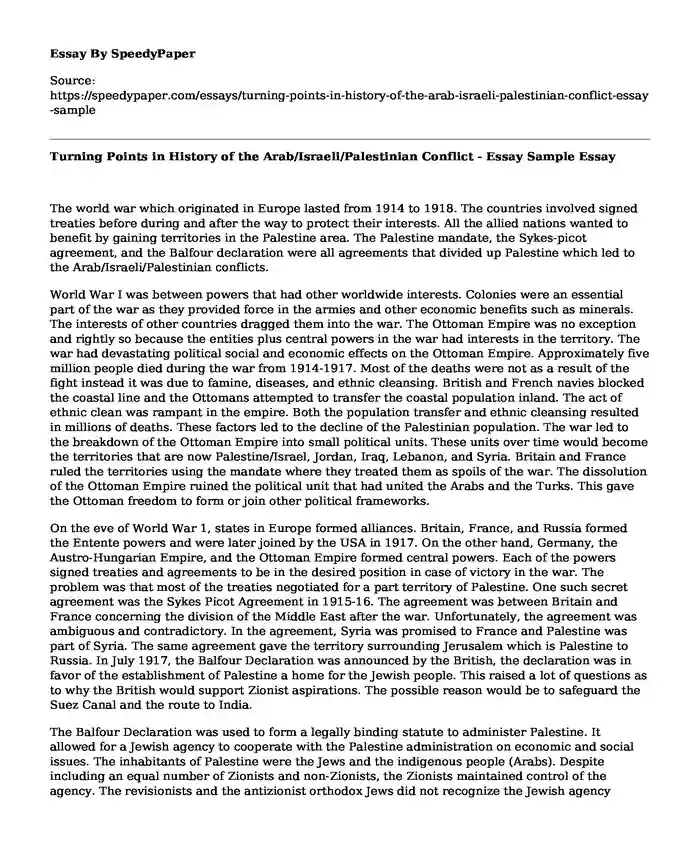The world war which originated in Europe lasted from 1914 to 1918. The countries involved signed treaties before during and after the way to protect their interests. All the allied nations wanted to benefit by gaining territories in the Palestine area. The Palestine mandate, the Sykes-picot agreement, and the Balfour declaration were all agreements that divided up Palestine which led to the Arab/Israeli/Palestinian conflicts.
World War I was between powers that had other worldwide interests. Colonies were an essential part of the war as they provided force in the armies and other economic benefits such as minerals. The interests of other countries dragged them into the war. The Ottoman Empire was no exception and rightly so because the entities plus central powers in the war had interests in the territory. The war had devastating political social and economic effects on the Ottoman Empire. Approximately five million people died during the war from 1914-1917. Most of the deaths were not as a result of the fight instead it was due to famine, diseases, and ethnic cleansing. British and French navies blocked the coastal line and the Ottomans attempted to transfer the coastal population inland. The act of ethnic clean was rampant in the empire. Both the population transfer and ethnic cleansing resulted in millions of deaths. These factors led to the decline of the Palestinian population. The war led to the breakdown of the Ottoman Empire into small political units. These units over time would become the territories that are now Palestine/Israel, Jordan, Iraq, Lebanon, and Syria. Britain and France ruled the territories using the mandate where they treated them as spoils of the war. The dissolution of the Ottoman Empire ruined the political unit that had united the Arabs and the Turks. This gave the Ottoman freedom to form or join other political frameworks.
On the eve of World War 1, states in Europe formed alliances. Britain, France, and Russia formed the Entente powers and were later joined by the USA in 1917. On the other hand, Germany, the Austro-Hungarian Empire, and the Ottoman Empire formed central powers. Each of the powers signed treaties and agreements to be in the desired position in case of victory in the war. The problem was that most of the treaties negotiated for a part territory of Palestine. One such secret agreement was the Sykes Picot Agreement in 1915-16. The agreement was between Britain and France concerning the division of the Middle East after the war. Unfortunately, the agreement was ambiguous and contradictory. In the agreement, Syria was promised to France and Palestine was part of Syria. The same agreement gave the territory surrounding Jerusalem which is Palestine to Russia. In July 1917, the Balfour Declaration was announced by the British, the declaration was in favor of the establishment of Palestine a home for the Jewish people. This raised a lot of questions as to why the British would support Zionist aspirations. The possible reason would be to safeguard the Suez Canal and the route to India.
The Balfour Declaration was used to form a legally binding statute to administer Palestine. It allowed for a Jewish agency to cooperate with the Palestine administration on economic and social issues. The inhabitants of Palestine were the Jews and the indigenous people (Arabs). Despite including an equal number of Zionists and non-Zionists, the Zionists maintained control of the agency. The revisionists and the antizionist orthodox Jews did not recognize the Jewish agency authority. The indigenous people also felt that the political order of aliens in their midst was being imposed on them. The Arab revolt in 1915 also had consequences because it was seen as a betrayal by the British. This is because the Arab warlords were confident they would be given Palestine as part of Arab states in the Ottoman Empire.
Conclusion
In conclusion, the Palestine area was an area of interest to various powers. All the rivals wanted a territory in Palestine for their interest. Consequently, the signed treaties were ambiguous and left the parties involved feeling betrayed if they didn’t get part of the Ottoman Empire. The Palestinian inhabitants were further divided due to either the entities or central powers empowering one group only.
Cite this page
Turning Points in History of the Arab/Israeli/Palestinian Conflict - Essay Sample. (2024, Jan 06). Retrieved from https://speedypaper.com/essays/turning-points-in-history-of-the-arab-israeli-palestinian-conflict-essay-sample
Request Removal
If you are the original author of this essay and no longer wish to have it published on the SpeedyPaper website, please click below to request its removal:
- Temple of Caesar, Art Essay Sample for Students
- Should the United States Have Gone to War in Vietnam? Essay Example
- Essay Example: Was Cold War Inevitable?
- Civil War Essay Example - Opening Moves
- Free Essay on the Eighteenth-Century Politics of Consumption: The Boston Tea Party
- Essay Example on the 1930's Great Depression and the WWII Aftermath
- Free Essay in Americah History: Underground Rail Road
Popular categories





